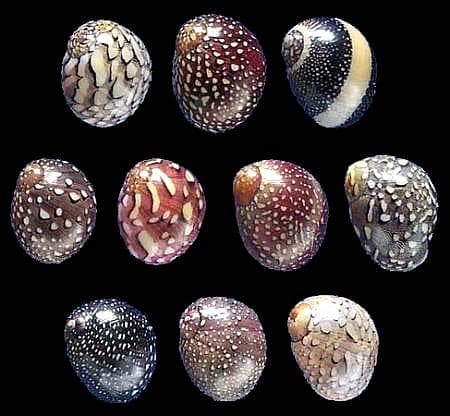Common name: Virgin Nerite
General Information
The Virgin Nerite (Vitta virginea) is a small, hardy snail species cherished by aquarists for its algae-eating prowess and attractive shell patterns. Its shell is typically dark with intricate, wavy patterns of lighter colors, making it a subtle yet elegant addition to any aquarium. These snails are native to brackish and marine environments in the Caribbean and parts of the Atlantic Ocean, where they play an essential role in controlling algae growth on rocks and other surfaces.
Virgin Nerites are particularly popular among aquarists due to their peaceful nature and utility in maintaining clean tanks. They are excellent for hobbyists looking to manage algae without resorting to chemical treatments. Additionally, their small size and non-invasive behavior make them suitable for a wide range of tank setups, from nano aquariums to larger reef systems.
Details
- Estimated price
- Cheap Affordable and widely available in the aquarium trade
- Recommended minimum volume
- 20 liter (5.3 gallons)
- Salinity
- S.G. 1.020 to 1.025
- Temperature
- 24 to 28 °C (75 to 82 °F)
- Acidity
- pH 7.5 to 8.5
- Average size
- 2 cm (¾″)
- Care level
- Very easy Perfect for beginners due to their hardiness and algae-eating skills
- Diet
- Herbivore Feeds on algae, biofilm, and detritus; supplement with algae wafers if needed
- Reefsafe
- Yes
- Aggression
- Peaceful
- Captive bred
- No
Taxonomy
- KingdomAnimalsAnimalia
- PhylumMollusksMollusca
- ClassGastropodsGastropoda
- OrderNerite SnailsCycloneritimorpha
- FamilyNerite SnailsNeritidae
- GenusNerite SnailsVitta Mörch, 1852
- SpeciesVirgin NeriteVitta virginea (Linnaeus, 1758)
- SynonymsNerita bahiensis (Récluz, 1850)Nerita cardinalis Röding, 1798Nerita chlorina Link, 1807Nerita fasciola Récluz, 1850Nerita listeri L.Pfeiffer, 1840Nerita marmorata Link, 1807Nerita nigrocincta Röding, 1798Nerita phrygia Dillwyn, 1823Nerita tigris Récluz, 1850Nerita virginea Linnaeus, 1758Neritina braziliana G.B.Sowerby II, 1849Neritina cajennensis Rigacci, 1866Neritina listeri (L.Pfeiffer, 1840)Neritina matoni Mörch, 1852Neritina minor Metcalf, 1904Neritina trabalis Mörch, 1852Neritina turriculata Menke, 1828Neritina virginea (Linnaeus, 1758)Neritina virginea listeri (L.Pfeiffer, 1840)Neritina virginia (Linnaeus, 1758)
- Source: GBIF | Global Biodiversity Information Facility
Care
Virgin Nerites are relatively easy to care for, making them a great choice for beginners and experienced aquarists alike. They thrive in tanks with stable water parameters, plenty of algae or biofilm to graze on, and minimal competition for food. While they can tolerate a range of salinities, they do best in brackish to marine conditions. Ensure the tank has a secure lid, as these snails are known to explore above the waterline and may escape if given the chance.
Providing a variety of surfaces like rocks, driftwood, and glass will allow them to exhibit their natural grazing behavior. Avoid housing them with aggressive tank mates that may prey on or harass them, such as certain crabs or predatory fish.
Diet and Feeding
Virgin Nerites are herbivores, primarily feeding on algae, biofilm, and detritus. They are excellent at cleaning up nuisance algae, including diatoms and green film algae, making them a valuable addition to any cleanup crew. While they can often sustain themselves on naturally occurring algae in the tank, supplemental feeding with algae wafers or blanched vegetables like zucchini can ensure they remain well-fed, especially in newer or less mature aquariums.
Feed sparingly, as overfeeding can lead to water quality issues. Monitor their activity levels and shell condition to ensure they are getting enough to eat.
Behavior and Compatibility
Virgin Nerites are peaceful and non-aggressive, making them ideal tank mates for a variety of community setups. They coexist well with other peaceful invertebrates and fish, provided there is no competition for food or predation risk. Their small size and slow movement make them vulnerable to aggressive species, so care should be taken when choosing tank mates.
These snails are known for their tendency to climb out of the water, especially in brackish setups. This behavior is natural and not a sign of distress, but it does mean that a secure tank lid is essential to prevent escapes.
Reproduction
While Virgin Nerites may lay eggs in captivity, successful breeding is rare. Their larvae require brackish water conditions to develop, which are difficult to replicate in most home aquariums. The eggs, often seen as small white dots on surfaces, will not hatch in fully marine or freshwater setups, making these snails a low-maintenance choice for aquarists who prefer not to deal with overpopulation.
Health and Common Issues
Virgin Nerites are hardy and resilient, but they can be sensitive to sudden changes in water parameters. Maintaining stable salinity, pH, and temperature is key to their health. Ensure the tank is free of copper-based medications, as copper is toxic to invertebrates.
When selecting Virgin Nerites, look for individuals with intact, smooth shells and active movement. Avoid snails with cracked or eroded shells, as this may indicate poor health or unsuitable water conditions.
Habitat
In the wild, Virgin Nerites inhabit rocky coastal areas, mangroves, and tidal zones, where they graze on algae and biofilm. They are adapted to both brackish and marine environments, making them versatile and adaptable in captivity. Replicating their natural habitat with plenty of surfaces to graze on and stable salinity levels will help them thrive in your aquarium.






